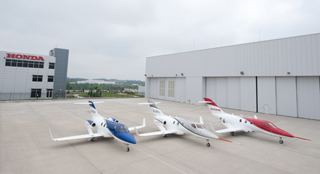HondaJet Reaches Maximum Operating Altitude of 43,000 Ft.
 Honda Aircraft Company, Inc., today announced at the annual European Business Aviation Convention & Exhibition (EBACE) in Geneva, Switzerland, that it has successfully completed additional milestone flight tests with its FAA-conforming HondaJet, including the achievement of a maximum operating altitude of 43,000 ft. This accomplishment follows soon after Honda’s advanced light business jet recorded a maximum speed of 425KTAS (489 mph) during flight testing at the company’s Greensboro, North Carolina, world headquarters facility.
Honda Aircraft Company, Inc., today announced at the annual European Business Aviation Convention & Exhibition (EBACE) in Geneva, Switzerland, that it has successfully completed additional milestone flight tests with its FAA-conforming HondaJet, including the achievement of a maximum operating altitude of 43,000 ft. This accomplishment follows soon after Honda’s advanced light business jet recorded a maximum speed of 425KTAS (489 mph) during flight testing at the company’s Greensboro, North Carolina, world headquarters facility.
The 43,000 ft. mark – reached on April 27, 2011 – confirms the company’s maximum-operating-altitude performance commitment to customers for the FAA-conforming HondaJet. In addition, the aircraft has achieved a climb rate of 3,990 ft./min., confirming another important performance parameter for the delivery aircraft.
“We are very encouraged by the achievement of these important performance milestones at this early phase of the HondaJet flight test program,” said Michimasa Fujino, Honda Aircraft Company President & CEO. “Our flight test data indicate that the aircraft is performing as expected, and our team continues to work hard to realize additional performance milestones as we move forward.”
The first FAA-conforming HondaJet (F1), which achieved first flight on December 20, 2010, will soon be joined by additional conforming aircraft to supplement the company’s certification efforts. A second conforming aircraft (ST1) already has been completed and undergone extensive structural testing under various load conditions to ensure conformity with all certification requirements. Furthermore, Power-On testing has been completed successfully on a third conforming aircraft (F2) that will be used for flight testing. Honda is nearing completion of function testing on this aircraft, which is scheduled to take flight this summer.
A fourth conforming aircraft (F3), to be used for additional flight testing, has progressed through the major assemblies consolidation phase and is now in the early stages of systems installation. A fifth conforming aircraft (ST2) also is planned to be completed in early 2012 to support additional stress and extensive fatigue testing. Concurrent with the assembly of conforming aircraft, Honda continues to conduct numerous component qualification tests for each aircraft system to support the certification program.
“In order to maximize the effectiveness of our flight test program and to support an accelerated certification process, we will add a sixth conforming aircraft (F4) to our certification fleet,” said Fujino. “This test aircraft will take flight in spring 2012 and will support cabin systems testing, as well as functions and reliability testing. With a total of six aircraft planned to support the certification process, we believe we will have optimal resources to meet both our flight test program needs and our certification schedule.”
As Honda progresses through the certification program, the company is focused simultaneously on the process of equipping and manning its new HondaJet production facility, which was recently completed on the company’s Greensboro campus. Pre-production planning and preparations are in progress as equipment and personnel begin to move into the facility. Training of production staff will soon be underway to support the HondaJet production ramp-up beginning in 2012.
The 263,400 ft2 HondaJet production facility integrates under one roof all aspects of assembly, painting, completion, inspection and flight testing of delivery aircraft. This unique approach to production will provide Honda with a distinct advantage within the industry by allowing the company to create the highest quality aircraft possible within a totally integrated assembly and testing environment.